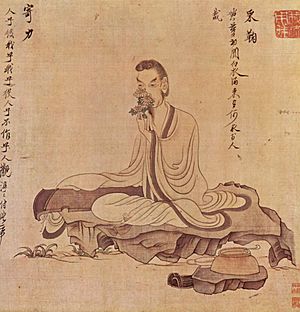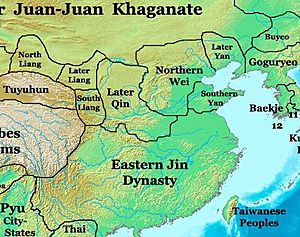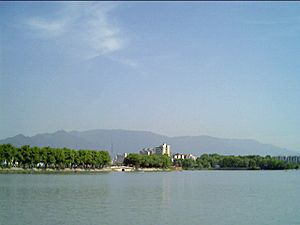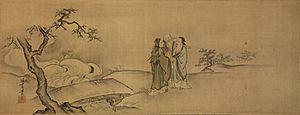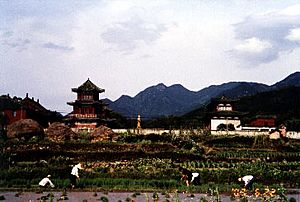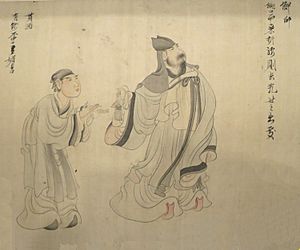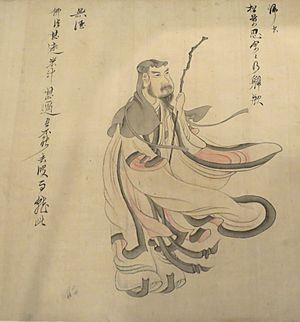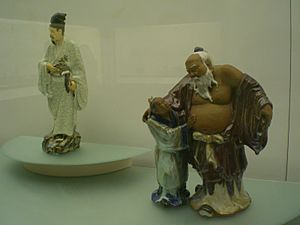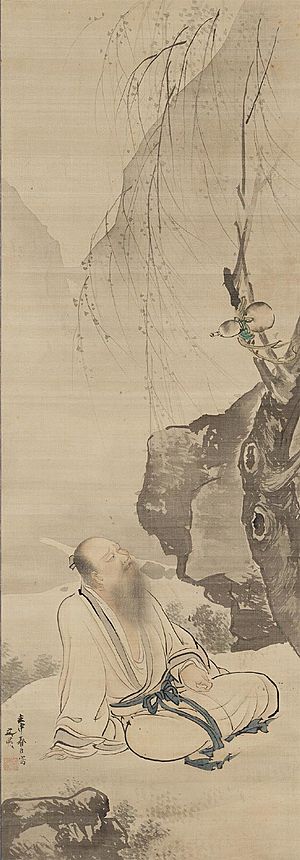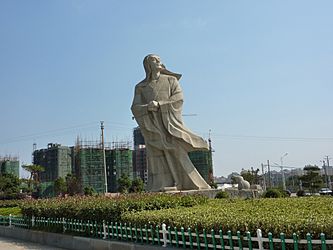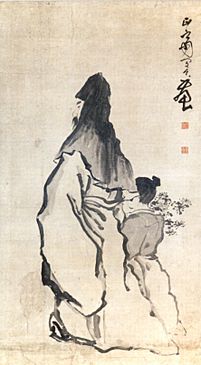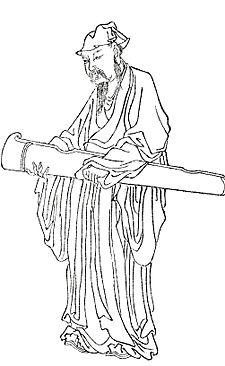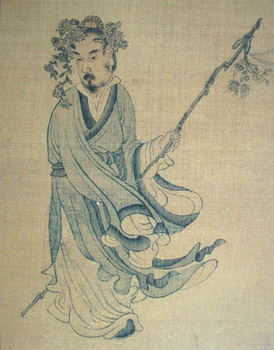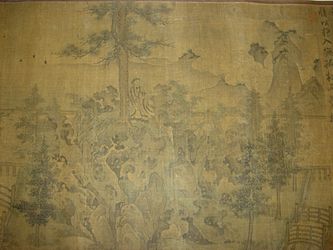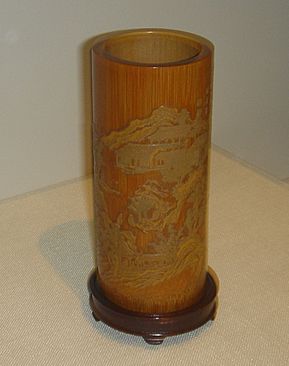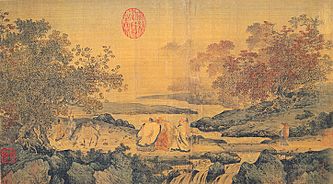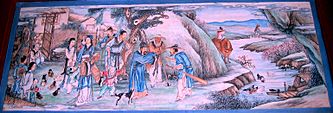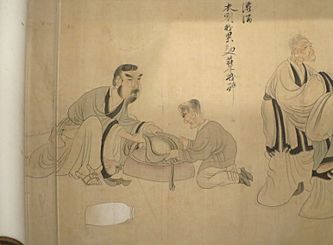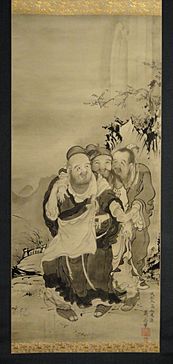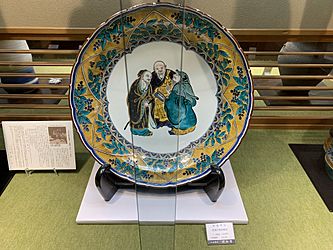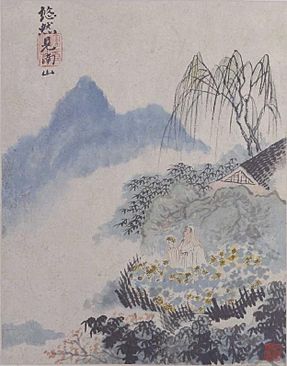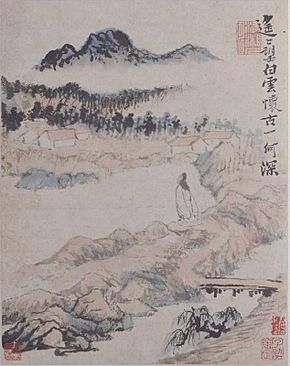Tao Yuanming facts for kids
| Tao Yuanming | |||||||||||||||||||||||||
|---|---|---|---|---|---|---|---|---|---|---|---|---|---|---|---|---|---|---|---|---|---|---|---|---|---|
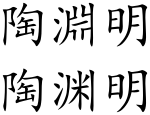
"Tao Yuanming" in Traditional (top) and Simplified (bottom) Chinese characters
|
|||||||||||||||||||||||||
| Traditional Chinese | 陶淵明 | ||||||||||||||||||||||||
| Simplified Chinese | 陶渊明 | ||||||||||||||||||||||||
|
|||||||||||||||||||||||||
| Alternative Chinese name | |||||||||||||||||||||||||
| Chinese | 陶潛 | ||||||||||||||||||||||||
| Literal meaning | (original name) | ||||||||||||||||||||||||
|
|||||||||||||||||||||||||
Tao Yuanming (simplified Chinese: 陶渊明; traditional Chinese: 陶淵明; pinyin: Táo Yuānmíng; 365–427), also known as Tao Qian (pinyin: Táo Qián), was a famous Chinese poet and politician. He lived during the Six Dynasties period, a time of many changes in China.
Tao Yuanming was born during the Eastern Jin dynasty (317–420) and passed away during the Liu Song dynasty (420–479). He spent much of his life away from city life, living in the countryside. He enjoyed farming, reading, drinking wine, and spending time with friends. He wrote many poems about the joys and challenges of life, and why he chose to leave government work.
His writing style was simple and direct, which was different from other writers of his time. Later, during the Tang dynasty (618–907) and especially the Northern Song dynasty (960–1127), famous writers like Su Shi praised him. They saw him as a true and natural poet. Tao Yuanming is now known as a leading figure in what is called Fields and Gardens poetry. He found beauty and peace in nature around him.
Tao Yuanming is also shown in the Wu Shuang Pu (Table of Peerless Heroes), a book of famous people.
Contents
Names
In the middle of his life, Tao Yuanming changed his name to Tao Qian. The name "Qian" means "hiding." He chose this name to show that he was stepping away from politics. He wanted to live a quiet life in the countryside.
Another name he used when he was young was "Master of the Five Willows." He even wrote an essay about himself using this name. After the Eastern Jin dynasty ended in 420, he started using "Qian." This showed his decision to live a simple life, away from the government.
Other names like Yuanliang, Shenming, and Quanming are also linked to Tao Yuanming. This happened because of a naming taboo during the Tang dynasty. It was forbidden to use characters from an emperor's name. The first Tang emperor's name included the character yuan. So, people used similar characters like shen (meaning "depths") instead.
Life Story
Family Background
Tao Yuanming's great-grandfather was Tao Kan (259–334), a famous general and governor during the Jin dynasty. His grandfather and father were also government officials. However, Tao Yuanming's family was not very rich or powerful when he was born. His father passed away when Tao Yuanming was only eight years old.
His Times
Tao Yuanming lived during the Eastern Jin dynasty (316/317 – 419/420 CE). This was a time of much trouble in China. The Jin dynasty was known for corruption and fighting among powerful families. There were also many rebellions and attacks from groups outside the empire.
Eventually, the Jin dynasty was replaced by the Liu Song dynasty in 419/420. This new dynasty was also short-lived and had its own problems. Tao Yuanming saw all these changes during his life.
Where He Was Born
Tao Yuanming was born in Chaisang, which is now part of Jiujiang city in Jiangxi Province, China. The name Chaisang means "Mulberry-Bramble." This area was close to Mountain Lu and Poyang Lake. It was a beautiful place with many natural features.
Younger Years
We don't know many details about Tao Yuanming's early life. But we know he grew up in a challenging time. When he was around 18 or 19, there was a big battle called the Battle of Fei River (383). This battle was very important for the Eastern Jin dynasty.
The Tiger Creek Bridge Story
Tao Yuanming's birthplace was near Mountain Lu. This mountain became a center for Buddhism. A Buddhist priest named Huiyuan built the Donglin Monastery there in 386. Many scholars and poets, including Tao Yuanming, visited Huiyuan.
There's a famous story about Huiyuan, Tao Yuanming, and another scholar. Huiyuan was supposed to never leave the monastery grounds. The border was a bridge over Tiger Creek, named for tigers in the area. One day, after Tao Yuanming and the other scholar visited, Huiyuan walked them out. He got so caught up in their conversation that he didn't notice he had crossed the bridge. When the tigers heard them, they roared loudly. This made Huiyuan realize he had left the monastery. The three men then burst out laughing together. This story is shown in famous paintings called "Three Laughing Men at Tiger Creek."
Time in Government
Tao Yuanming worked for the government for more than ten years, in five different periods. He served in both civil and military roles. This meant he traveled to the capital city, Jiankang, which was a busy place. During this time, his poems show that he felt torn. He wanted to achieve things in government, but he also wanted to live a quiet life.
Why He Left Government
Tao Yuanming worked for different leaders, including Huan Xuan and Liu Yu. These were difficult times with a lot of political problems and corruption. Tao Yuanming's poems show how unhappy he was with this work.
His last job was as a county magistrate in Penze. This job only lasted about eighty days. He wrote an essay called "To Return," where he explained why he wanted to leave government work. He mentioned having "a house full of little kids" and wanting to go home.
One famous reason for his resignation was that he refused to "bow like a servant in return for five pecks of grain." This saying means "swallowing one's pride for a small salary." Even though his salary was more than "five pecks," it was a symbolic way of saying he wouldn't compromise his values for money. After this, he refused all offers to return to government service.
The poet Su Shi later said that Tao Yuanming "worked for the government when he wanted to, without feeling shame; retiring when he wanted to, without thinking himself lofty."
Returning to the Fields
In the spring of 405, Tao Yuanming decided to leave his government job for good. His sister's death and his dislike for the corruption in the Jin government made him resign. For the last 22 years of his life, he lived peacefully on his small farm.
Family Life
Tao Yuanming was married twice. His first wife passed away when he was in his thirties.
He had five sons. His oldest son was Tao Yan. In a letter to his sons, he apologized for any hardship they faced because he chose to live by his ideals instead of working for the government. The letter shows how much he cared for his family.
Beliefs and Ideas
Tao Yuanming's writings show that he was influenced by three main ideas: Confucianism, Buddhism, and Taoism.
When he was young, he enjoyed studying the Five Classics, which are important Confucian texts. His Taoist influence can be seen in lines like "I long to return to Nature" from his poem "Returning to Country and Farming." He wanted a simple life, letting nature take its course.
He also showed a Buddhist side, even though he never formally became a Buddhist. He wrote, "Life is like an illusion; everything returns to emptiness," which sounds like Buddhist teachings.
One scholar, Florence Chia-ying Yeh, said that Tao Yuanming was a very strong and honest person. She believed his strength came from understanding and using the best parts of Confucianism, Taoism, and Buddhism in his life and work.
Death
Most biographies say Tao Yuanming died in 427, at the age of 63.
Works and Legacy
About 130 of Tao Yuanming's works still exist today. These are mostly poems and essays that describe a peaceful farm life, often involving farming and drinking wine.
Poetry
Because his poems often talk about farming and drinking his homemade wine, he became known as the "Poet of the Fields." His poems encourage people to leave official life, move to the countryside, and enjoy a life of wine, poetry, and nature. But for Tao, this also meant actually working on a farm. His poems also show that he felt it was his duty to take care of his family.
Tao's simple writing style became more known as he gained local fame as a hermit. Later, his poems were included in major collections. By the Tang dynasty, he was seen as a great poet, admired by famous poets like Li Bai and Du Fu.
Tao Yuanming's poetry was new and special. It combined old poetic forms with his themes of returning to nature. His work became a landmark in Chinese literature. Many later Chinese paintings and stories would use images like "chrysanthemums by the eastern fence" to remind people of Tao Yuanming's life and poetry.
Famous Poems
Here is a part of a poem Tao wrote in 409, about a traditional Chinese holiday:
Written on the Ninth Day of the Ninth Month of the Year yi-yu
The many changes
happen all around us
And human life
how can it not be hard?
From olden times
everyone has to die,
Thinking of this
burns my very heart.
What can I do
to calm this feeling?
Only enjoy myself
drinking my unstrained wine.
I do not know
about a thousand years,
Rather let me make
this morning last forever.
Here is another poem, translated by Arthur Waley:
I built my hut in a zone of human habitation
I BUILT my hut where people live,
Yet near me there is no noise of horses or carriages.
Do you want to know how that is possible?
A heart that is far away creates a wilderness around it.
I pick chrysanthemums under the eastern hedge,
Then gaze long at the distant summer hills.
The mountain air is fresh at the end of the day:
The flying birds return in pairs.
In these things there is a deep meaning;
Yet when we try to say it, words suddenly fail us.
And another, "Returning to the Fields":
WHEN I was young, I didn't fit in with others:
My only love was for the hills and mountains.
Without knowing, I fell into the world's busy life
And was not free until I was thirty.
The migrating bird longs for its old home:
The fish in the tank thinks of its native pond.
I had cleared a patch of the Southern Moor
And, still simple, I returned to my field and garden.
My land is only about ten acres:
My small cottage has eight or nine rooms.
Elm and willow trees gather by the roof:
Peach and plum trees grow in front of the house.
Hazy, hazy are the distant small villages.
Steady is the smoke from the half-empty village,
A dog barks somewhere in the quiet lanes,
A rooster crows at the top of the mulberry tree.
At the gate and courtyard—no sound of the busy world:
In the empty rooms—peace and deep quiet.
For a long time I lived trapped in a cage:
Now I have returned to Nature and Freedom.
Tao's poems greatly influenced later poets during the Tang and Song Dynasties. Du Fu, a great admirer, wrote a poem about life in the countryside, saying:
- Only by wine one's heart is lit,
- only a poem calms a soul that's torn.
- You'd understand me, Tao Qian.
- I wish a little sooner I was born!
The Peach Blossom Spring
Besides his poems, Tao Yuanming is famous for a short, interesting story called "Peach Blossom Spring" (桃花源記). This story describes a hidden land, a perfect place away from the outside world. The name Peach Blossom Spring (桃花源, Tao Hua Yuan) is now a common Chinese term for a utopia, a perfect place.
The story says it happened during the Taiyuan era (376–396). A fisherman gets lost and finds a place where time seems to stand still. But after he leaves and tells others about it, he can never find it again. It's a very influential story in Chinese culture.
His Lasting Influence
Tao Yuanming's writings have inspired many poets and authors who came after him. For example, the Song dynasty poet Xin Qiji was influenced by him. Su Shi also wrote poems that matched Tao's style, using the same rhymes. The 16th-century Korean poet Yi Hwang was also inspired by Tao Yuanming.
What People Thought of His Work
Zhong Rong (468–518), an early critic, said Tao Yuanming's writing style was "spare and clear, with hardly an extra word."
Su Shi (1037–1101), a major poet of the Song era, said that Tao Yuanming was the only poet he truly admired. He was impressed by Tao as a person. Su Shi praised Tao Yuanming's poems for being "simple yet beautiful, spare yet full." He even said that Tao was greater than many other famous poets.
Huang Tingjian (1045–1105), another Song dynasty poet, said that when you are young, Tao's poems might seem difficult. But after you have lived a lot, reading them makes you realize how much you learned from life.
Lin Yutang (1895–1976) saw Tao Yuanming as a perfect example of someone who truly loved life. He praised the peace and simplicity in Tao's life and writing. He believed Tao Yuanming was one of the most balanced and complete characters in all of Chinese literature.
Frank Northen Magill, in Great lives from history (1988), highlighted the "honest beauty" of Tao Yuanming's poetry. He said that the "freshness of his images, his simple but inspiring morality, and his steady love of rural life shine through his humble words." Because of this, Tao Yuanming is seen as one of China's most skilled and easy-to-understand poets.
Gallery
Tao Yuanming has inspired not only generations of poets, but also painters and other artists.
-
A Song dynasty painting showing Tao's return to the mountains, early 12th century.
-
A bamboo brush holder from the 17th century. It has Tao Yuanming's poem "Returning to My Farm in the Field" carved on it.
-
Illustrations in the Spirit of Tao Yuanming's Poems 02, by Shitao (1642-ca. 1707).
Translation
Editions
- Meng Erdong ed. Tao Yuanming Ji Yi Zhu ISBN: 7-80626-064-1.
- Wu Zheshun ed. Tao Yuanming Ji ISBN: 7-80520-683-X
- David Hinton (translator). The Selected Poems of T'ao Ch'ien (Copper Canyon Press, 1993) ISBN: 1-55659-056-3.
- Karl-Heinz Pohl (translator). Der Pfirsichbluetenquell (Bochum University Press, 2002)
- Davis, A.R. T'ao Yuan-ming (Hong Kong, 1983) 2 vols.
- William Acker (translator). T'ao the Hermit: Sixty Poems by T'ao Ch'ien, 365–427 (London & New York: Thames and Hudson, 1952)
- Philippe Uguen-Lyon (translator), Tao Yuanming : Œuvres complètes 陶淵明集, Paris, Les Belles Lettres, 2022 ISBN: 978-2251452500.
See also
 In Spanish: Tao Yuanming para niños
In Spanish: Tao Yuanming para niños
- Boyi and Shuqi
- Chinese garden
- Classical Chinese poetry
- Fields and Gardens poetry
- History of Jiangxi
- Humble Administrator's Garden
- I. M. Pei
- Six Dynasties poetry
- Three laughs at Tiger Brook
- Utopia
- Xin Qiji
- Zhang Heng
 | Janet Taylor Pickett |
 | Synthia Saint James |
 | Howardena Pindell |
 | Faith Ringgold |


